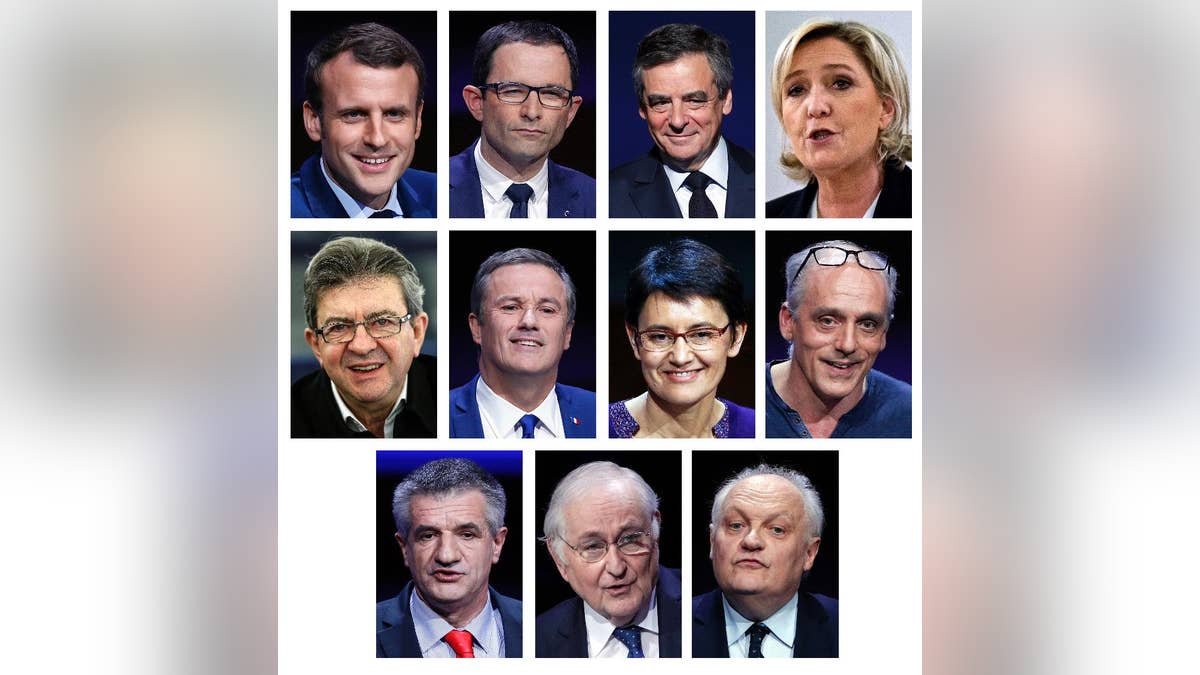
This combination of file photos show the eleven French official presidential candidates: Top from left: Emmanuel Macron, Benoit Hamon, Francois Fillon, Marine le Pen. Middle form left: Jean-Luc Melelchon, Nicolas Dupont-Aignan, Nathalie Arthaud, Philippe Poutou. Below from the left: Jean Lassalle, Jacques Cheminade, Francois Asselineau. Imagine if Americans elected a president who was neither Democrat nor Republican. France is facing a similarly shocking scenario: As the 11 candidates head into a debate Tuesday, the traditional left-right contenders are overshadowed by rivals pledging to turn today’s system on its head. (AP Photo/Christophe Ena, Francois Mori, Michel Euler, Jean-Francois Badias, Files) (The Associated Press)
PARIS – Imagine if Americans elected a president who was neither Democrat nor Republican. France may be facing a similarly shocking scenario: As the 11 presidential candidates head into a debate Tuesday, the traditional left-right contenders are overshadowed by rivals pledging to turn today's system on its head.
The debate may be pivotal. Polls show voter sentiment is constantly shifting, and a third of voters remain undecided with less than three weeks left before the April 23 first round. The two top candidates then advance to the decisive May 7 runoff.
Here's a look at the main candidates and their prospects:
MACRON
Bookmakers and financial markets are assuming the presidency will go to independent centrist Emmanuel Macron, a 39-year-old upstart who has no party. However, polls show his support is wobbly, with many of his potential voters still unconvinced he's the man to run this nuclear-armed country.
A former banker and protege of Socialist President Francois Hollande, Macron became the surprise front-runner on promises of energizing the world's sixth-largest economy and ditching the left-right political spectrum.
Lacking an entrenched party machine, he may struggle to build a parliamentary majority. He's already looking beyond the presidential race, and courting political heavyweights among the Socialists and the conservative Republicans ahead of legislative elections in June.
LE PEN
Far-right leader Marine Le Pen has set the agenda for the presidential campaign by railing against immigration and a perceived "Islamization" of France. She's such a political force that, for many voters, the race is about Le Pen vs. the rest.
While all polls suggest she would lose the runoff to Macron, she points to the victories of U.S. President Donald Trump and Brexit as proof that "anything is possible," and says she can pull off a surprise populist win.
It's unlikely, but not impossible. French voters appear restless after years of economic stagnation and broken promises. Unlike Macron, Le Pen enjoys solid support unlikely to be diminished by the debate or by new campaign scandals. And she has so successfully detoxified her once-pariah party that voters from left and right have joined her cause.
MELENCHON
The latest poll darling is Jean-Luc Melenchon, an anti-globalization campaigner with Communist Party backing and a powerful social media presence.
With humor and a far-left conviction, he shone in the last presidential debate and his ratings have spiked in recent days. Pollsters say voters think he understands their daily struggles and lives better than any other candidate.
Melenchon would yank France out of NATO, European treaties and international trade pacts. He sports jeans and a Chairman Mao-style jacket at campaign events.
THE OLD GUARD
So where does that leave the traditional parties that have led France for decades? Possibly in the dust.
Conservative Francois Fillon hopes his long-standing support among farmers, observant Catholics and the finance world will be enough to push him into the runoff.
But corruption charges are crippling his campaign and have deeply damaged his Republicans party. Accused of employing his wife and two children for taxpayer-funded jobs they never did, Fillon denies wrongdoing. But polls now put him a distant third, behind Macron and Le Pen.
The governing Socialists, meanwhile, are on the verge of a stunning collapse.
President Hollande is so unpopular he decided not to seek re-election, so the Socialists nominated Benoit Hamon. However, even his promise of a universal income have failed to charm voters. And his refusal to join forces with Melenchon will split the left-wing vote — and likely prevent either candidate from reaching the runoff.
THE SMALL CANDIDATES
The six other candidates could suck enough votes away from top contenders to sway the race.
Right-winger Francois Asselineau is campaigning for a "Frexit" from the European Union, as is left-leaning Jacques Cheminade, while Nicolas Dupont-Aignan also wants to restore France's "sovereignty."
The far left is further splintered between Trotskyist Nathalie Arthaud and Philippe Poutou of the New Anti-Capitalist Party.
Centrist candidate Jean Lassalle made headlines in 2006 when he lost 21 kilograms during a hunger strike for preserving jobs in his constituency.




















